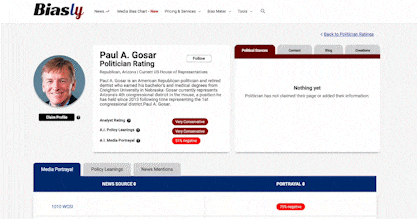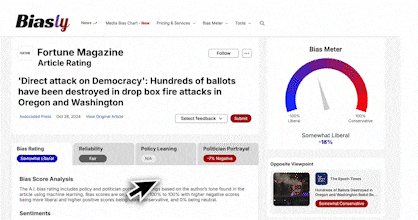The Surprising Impact of North Carolina's New Voter ID Law
- Bias Rating
-24% Somewhat Liberal
- Reliability
75% ReliableGood
- Policy Leaning
-24% Somewhat Liberal
- Politician Portrayal
N/A
Continue For Free
Create your free account to see the in-depth bias analytics and more.
Continue
Continue
By creating an account, you agree to our Terms and Privacy Policy, and subscribe to email updates. Already a member: Log inBias Score Analysis
The A.I. bias rating includes policy and politician portrayal leanings based on the author’s tone found in the article using machine learning. Bias scores are on a scale of -100% to 100% with higher negative scores being more liberal and higher positive scores being more conservative, and 0% being neutral.
Sentiments
-29% Negative
- Liberal
- Conservative
| Sentence | Sentiment | Bias |
|---|---|---|
Unlock this feature by upgrading to the Pro plan. | ||
Reliability Score Analysis
Policy Leaning Analysis
Politician Portrayal Analysis
Bias Meter
Extremely
Liberal
Very
Liberal
Moderately
Liberal
Somewhat Liberal
Center
Somewhat Conservative
Moderately
Conservative
Very
Conservative
Extremely
Conservative
-100%
Liberal
100%
Conservative

Contributing sentiments towards policy:
56% : Today, however, at least 35 states have ID requirements, a prerequisite that has become broadly popular among voters across party lines who see it as a common-sense precaution.51% : " Studies of the mandates have reached mixed conclusions, but most suggest that if ID requirements reduce voter turnout, the effect is small.
50% : " Although the latest law is far more forgiving than the 2013 version, Professor Cooper said, "Republicans get to accurately claim a win and tell voters they delivered voter ID -- which, by the way, the voters of North Carolina voted for."
50% : Meanwhile, the state's decadelong struggle over voter ID continues.
48% : "I don't know what it accomplishes, other than for some folks who really feel it's needed, it's enough," Bob Phillips, the executive director of Common Cause North Carolina and a steadfast opponent of voter ID laws, said of the requirement.
43% : After a decade of battles over voter ID, the law that finally went into effect landed with a whimper, not a bang.
40% : But the rise of an election denial movement that seeks tougher voting rules has relegated ID laws to the back row of priorities.
*Our bias meter rating uses data science including sentiment analysis, machine learning and our proprietary algorithm for determining biases in news articles. Bias scores are on a scale of -100% to 100% with higher negative scores being more liberal and higher positive scores being more conservative, and 0% being neutral. The rating is an independent analysis and is not affiliated nor sponsored by the news source or any other organization.

























 NY Times
NY Times


